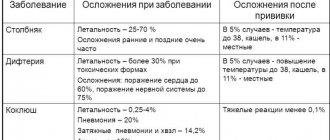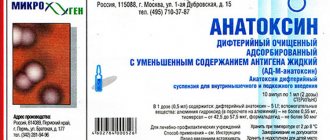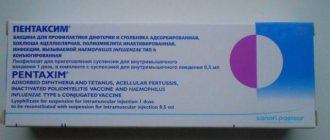Diphtheria is a terrible infectious disease.
The mortality rate in case of infection is simply amazing - 50-70 cases out of 100 infected.
Therefore, it is very important to prevent the disease and vaccinate children against diphtheria in infancy, rather than fight it later. Vaccination has been saving millions of children from this terrible disease for more than 50 years in a row, reducing the incidence of infection by up to 10%.
Diphtheria is a dangerous disease, but there is a vaccination against it. Now we will look at what this vaccination against diphtheria is, its types, contraindications and consequences of administration.
Features of the vaccine
Most often, the vaccine is administered to a child in infancy, usually at three months of age. The vaccine, in fact, is a weakened toxin of the diphtheria bacillus, which is not able to develop in the baby’s body, but creates antibodies to subsequently combat this disease.
If there are no contraindications (which we will talk about later) for administering the vaccine, then it is administered to the baby along with other toxins. Usually, vaccination against diphtheria is carried out in combination with vaccination against whooping cough and tetanus.
This definitely has its advantages:
- firstly , you can reduce the number of injections for a baby from three to one;
- secondly , the negative reaction of the body in children can also be reduced, instead of several times to once;
- thirdly , modern laboratories can combine these components together, since they all require aluminum hydroxide as an active substance.
Salvation is in vaccination
The only way to avoid an epidemic is to carry out total immunization of children and adults, covering at least 95 percent of the population. For this purpose, the diphtheria vaccine DTP and ADS-M is used.
DPT is used to vaccinate children; DPT-M is administered during routine revaccination - a repeat cycle of vaccinations at 6, 11 and 16 years of age. It is also injected into adults.
The DPT vaccine is a combination of killed whooping cough microbes and two toxoids - tetanus and diphtheria. Now domestic medicine is increasingly switching from it to Pentaxim and Infanrix - more effective modern analogues.
ADS-M is a combined preparation of purified diphtheria and tetanus toxoids with reduced content. It is used not only for revaccination, but also for vaccination - in cases where the patient cannot tolerate the pertussis component of the DTP vaccine.
Important! All diphtheria vaccines undergo strict sanitary control at manufacturing plants and are quite suitable for vaccination campaigns: there is no need to be afraid of them.
Types of vaccinations
There are three types of vaccinations:
The first and most common type of vaccination is DTP - this is a complex consisting of three sticks found in the vaccine (whooping cough, diphtheria, tetanus). It is used for almost all children under 6 years of age.
The next injection is the ADS, which only includes the tetanus and diphtheria vaccinations. Vaccination against diphtheria and tetanus is also given to children under 6 years of age, but it is used only if the child has contraindications for the whooping cough vaccine.
The latest widespread vaccine is ADS-M. It is used for children who are over 6 years old, as well as for adults who received DTP vaccination in childhood. It also included a vaccine against tetanus and diphtheria.
Indications and contraindications
Before vaccination, the local doctor must examine the baby and decide whether he should be vaccinated.
Strict contraindications for diphtheria vaccination are:
- significant disturbances in the child’s nervous system;
- allergies to previous injections;
- spasms or brain disturbances;
- epidemics of any diseases;
- mental disorders;
- traumatic brain injury during childbirth.
Conditions in which it is necessary to temporarily postpone vaccination:
- infectious diseases;
- temporary exacerbation of chronic diseases;
- deviations in the intestinal bacterial flora;
- premature birth leading to insufficient weight;
- severely tolerated previous injections;
- temperature rise to 40 degrees and above.
Professions with mandatory vaccinations
According to the legislation of the Russian Federation, voluntary participation in preventive vaccination against diphtheria is established for residents of Russia. There are exceptions for citizens whose professional activities may involve a real risk of illness and further spread of infection.
Subject to mandatory vaccination:
- agricultural or forestry workers located in areas with an increased risk of infection;
- employees involved in catching stray animals;
- housing and communal services personnel involved in cleaning sewer facilities;
- physicians who are in constant contact with people with infectious diseases;
- all education workers;
- military personnel and railway employees.
The use of diphtheria vaccination and the effect on pregnancy
According to the recommendations of the World Health Organization, it is safe for pregnant women to be vaccinated against diphtheria if 10 years have passed since the previous one. If a woman has not completed the initial three vaccinations, she must undergo them during pregnancy. This is necessary so that in the first months of life the child already has antibodies that protect him. It is recommended to administer vaccine preparations to a woman before the twelfth week of pregnancy.
When is vaccination done?
As mentioned earlier, the first vaccine should be given to a child at three months of age. However, three to four vaccinations are required to achieve complete immunization against diphtheria. After the baby has been given an injection at three months, it continues to be given at intervals of 45 days.
That is, the next injection will be given to the child at 4.5 months of age, then at six months after reaching a certain age.
As a rule, after the first three vaccinations, the child becomes fully susceptible to diphtheria.
However, in order to maintain the body's immunization, two more subsequent injections are given. The first one is administered after a short break to the child at the age of one and a half years, and the subsequent vaccine is administered to the child at 6 or 7 years of age.
If everything is followed correctly, then your child’s immunity will stabilize for 10 years, and he will not face dire consequences in the form of diphtheria infection. However, it will be important to revaccinate upon reaching 16-17 years of age.
Where is immunization carried out?
Nowadays, you can get vaccinated at any public clinic. By contacting the department at the place of attachment, the patient will receive the immunization service with a domestic vaccine free of charge - this area is annually funded by the state.
At seven and fourteen years of age, immunization is carried out in the school's medical office, if there is one.
There are special vaccination centers that provide such services on a paid basis. Here, patients will be offered drugs from various manufacturers.
It is possible to purchase an imported vaccine (as well as a domestic one) at pharmacies, then go to the vaccination office so that the nurse administers the drug intramuscularly. In this case, it should be remembered that the ampoule must be stored in compliance with the temperature regime, and that its shelf life is limited. It is better to buy the product immediately before vaccination.
Where is the injection given?
This question also interests many parents.
Usually, the injection is given so that the vaccine gets into the muscle, where it will reach its final goal. To do this, it is customary to choose either the shoulder blade, the thigh, or the left forearm.
However, this choice only applies to children; adults do not receive this injection intramuscularly, but instead administer the vaccine subcutaneously.
Contraindications to vaccination
To ensure that the diphtheria vaccine does not cause serious harm to the child’s health, all doctor’s instructions should be followed. Therefore, before vaccinating your baby, you need to familiarize yourself with a number of contraindications to such a procedure.
One of the main contraindications to vaccination is the presence of an ongoing infectious disease. Even if your child just has a runny nose, it is best to delay vaccination until he has fully recovered.
Also contraindications are the presence of diathesis or eczema in the child. In addition, you should postpone the injection if the child is currently taking strong medications, which can also affect the body's response.
Children are not given an injection for diphtheria at all if they are intolerant to one of the components of the drug. In all other cases, the injection is simply postponed until the child has completely recovered, since to develop susceptibility to diphtheria, a healthy immune system with all its internal reserves is needed.
How is diphtheria treated in children?
It is important to hospitalize the child as quickly as possible.
Antibiotics will not help with the toxic form of diphtheria. The main method of treatment is the administration of anti-diphtheria serum (ADS), the dose and route of administration of which is calculated by the doctor individually. A complex of symptomatic treatment is carried out to help the child cope with the disease, and special nutrition is prescribed.
For non-toxic diphtheria, erythromycin and tetracycline work well. A seven-day course completely relieves the patient of the disease or carriage.
The effect of vaccination on the body
As noted earlier, the vaccine contains a diphtheria bacillus toxin, which is not capable of causing significant harm to a healthy body. On the contrary, this toxin provokes the host’s body to produce antitoxins to fight the disease. After which the body develops immunity to fight the real threat in the form of diphtheria.
Vaccination against diphtheria reduces the risk of contracting a terrible disease that destroys the mucous membrane of the carrier, which threatens the presence of unpleasant diphtheria ulcers that injure the tissue of the mucous membrane.
It is very difficult to defeat the disease both surgically and medically.
And as mentioned earlier, the mortality rate in case of infection is 50-70% of the total number of infected, despite the highly developed medicine in our time. Therefore, it is important to prevent the disease and prepare the body to fight it. Diphtheria is not so scary if children are vaccinated on time.
Is diphtheria vaccination necessary?
Accurate medical figures speak about the benefits of vaccination against diphtheria. Every year, in each country, a count of those who became ill and died from complications of this disease is carried out. But there is another important component that is difficult to calculate - this is the saving of parents’ time, their money and peace of mind, which they do not waste, since children today almost never get sick with this disease.
So, let's find out what universal vaccination against diphtheria has led to over the past decades.
- In countries where the population is vaccinated in almost 100% of cases, this disease occurs only in visitors or those people who were not previously vaccinated in a timely manner.
- 95% vaccination coverage provides complete protection against diphtheria bacillus.
- A previous disease does not guarantee that a child will not become infected with it again.
- Doctors can fight bacteria, but no treatment has yet been invented against their toxins, which is why in our time one of the most severe complications of diphtheria is death (up to 4% of cases).
- At a time when vaccinations were just being introduced into medicine, about 20% of all diseases in children were diphtheria, and the number of deaths was more than 50% of cases. These numbers have now been significantly reduced.
- The majority of young doctors nowadays know about classical diphtheria only from books. Modern doctors have to work only with those complications of diphtheria that have developed in older people who have recovered from the disease.
The need for vaccination against diphtheria is primarily due to the inability to combat the consequences of the disease. These include damage to the heart, kidneys, and diseases of the nervous system, accompanied by early and late paralysis. It is possible to cure the disease by completely relieving the inflammation of the throat and lowering the body temperature, but it is impossible to eliminate the weakness of the neck muscles due to paralysis, and it is impossible to restore the voice if the functioning of the nervous system is disrupted.
Pros and cons of vaccination
Despite the obvious benefits of vaccination, recently there has been a tendency to increase the number of refusals to vaccinate. Therefore, here I would like to discuss all the pros and cons of vaccination against diphtheria.
The main advantage is that your child will be protected from a terrible disease called diphtheria.
Since after vaccination, the risk of contracting the disease is only 10%, and even if your child becomes infected with diphtheria, the form of the disease and complications will be mild, which will contribute to a speedy recovery.
Despite the fact that you can write a refusal to undergo vaccination, in many professions the presence of this vaccination is an important criterion when hiring. Mandatory vaccination is present in such areas as agricultural, construction, medical, educational, and so on. Your child may simply not be hired for work without this injection.
The main disadvantage is the questionable reaction of the body. People often hear about side effects after diphtheria vaccination, therefore, wanting a better fate for their baby, they refuse the injection. We will talk about the side effects themselves and their frequency below.
Side effects after vaccination
Diphtheria vaccination generally does not cause serious side effects or pose a significant threat, and the effects of vaccination are very temporary. The body's reactions are quite varied, but despite their general rarity, the main adverse reactions of the body to the injection can be deduced.
- Local reactions of the body can be characterized by the following manifestations: thickening or swelling of the injection site, and slight pain in this place is also characteristic; A small bump or redness may also form at the injection site. However, all this is not fatal and goes away within a couple of days without any complications.
- From the general well-being of the child, the following unfavorable side effects are possible: general malaise and loss of strength, drowsiness, lethargy. Also, the child’s temperature may rise, but do not be alarmed, it can be brought down with a regular antipyretic.
As you can see, a child does not experience serious adverse reactions after diphtheria vaccination. All of them disappear within a few days after the injection. However, to be completely honest, you should also warn about possible complications after vaccination.
Rules of conduct before and after vaccination
Before vaccination, the pediatrician tells the child’s parents how to behave. Following medical recommendations reduces the risk of negative consequences and helps the baby tolerate immunization more easily.
- Avoid walks in the fresh air during the cold season and during epidemics. If the baby’s well-being and weather conditions allow, you can take short walks in uncrowded places.
- Avoid contact with sick people. After vaccination, the patient's immunity remains reduced for some time. In order not to catch a foreign infection, it is necessary to protect the child.
- You cannot give new foods or change the child’s diet. A new food can trigger an allergy, but the main suspicion falls on the vaccine.
- It is better to bathe your child in the shower on the day of vaccination. You should not take a hot bath or visit public reservoirs and swimming pools.
- You should not scratch the vaccine injection site, treat it with antiseptics or any other means. It is unacceptable to make compresses unless it has been recommended by a doctor.
- Closely monitor the child's condition, measure body temperature and, if necessary, use antihistamines or antipyretics in accordance with age.
- Give your baby more to drink and don’t force him to eat if he has no appetite.
Diphtheria vaccination is an affordable, safe and effective way to combat a dangerous disease. The number of child deaths from this pathology has reached its lowest point by 2021. The main credit for the absence of outbreaks of diphtheria epidemics is given to immunization.











